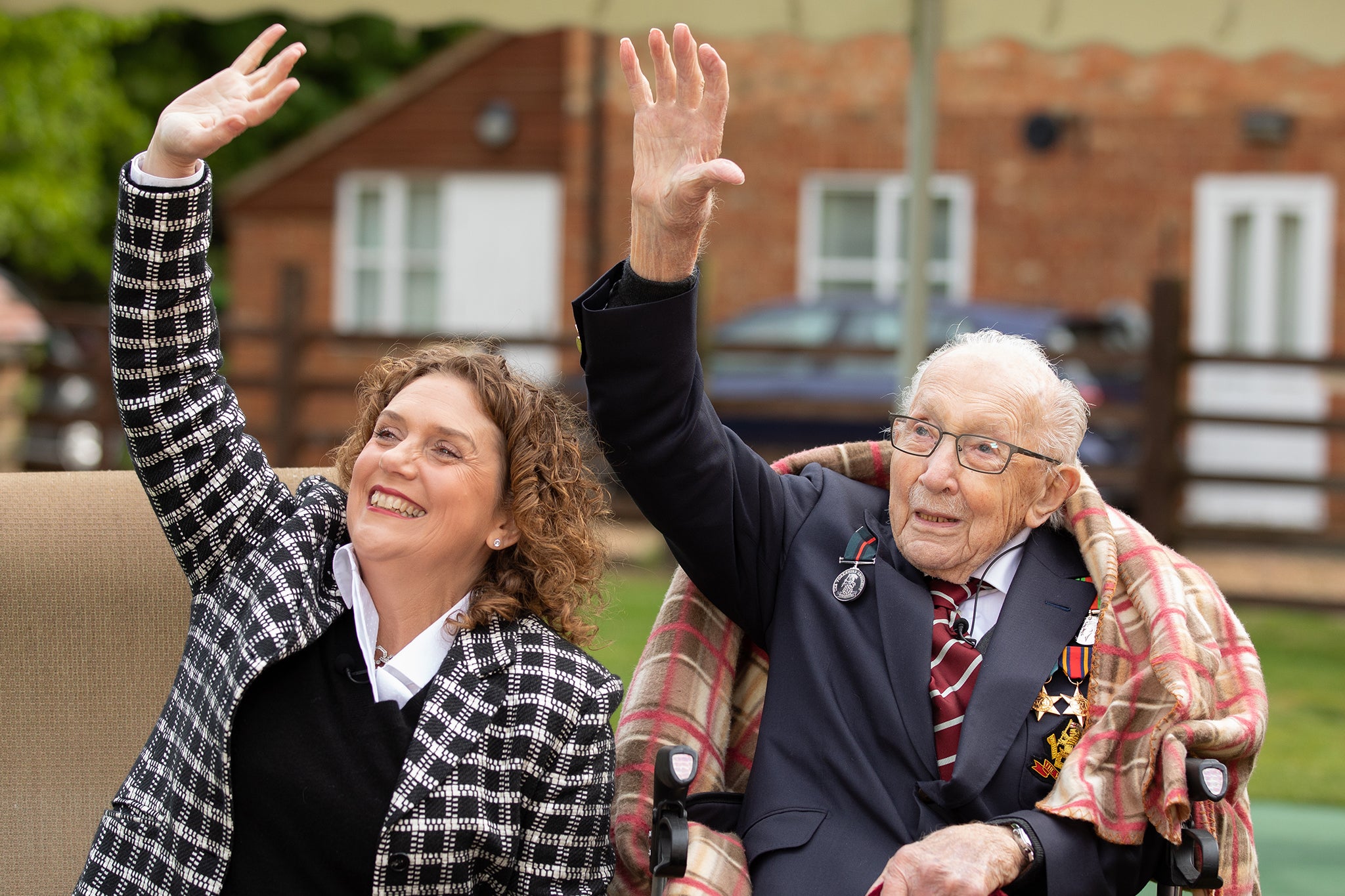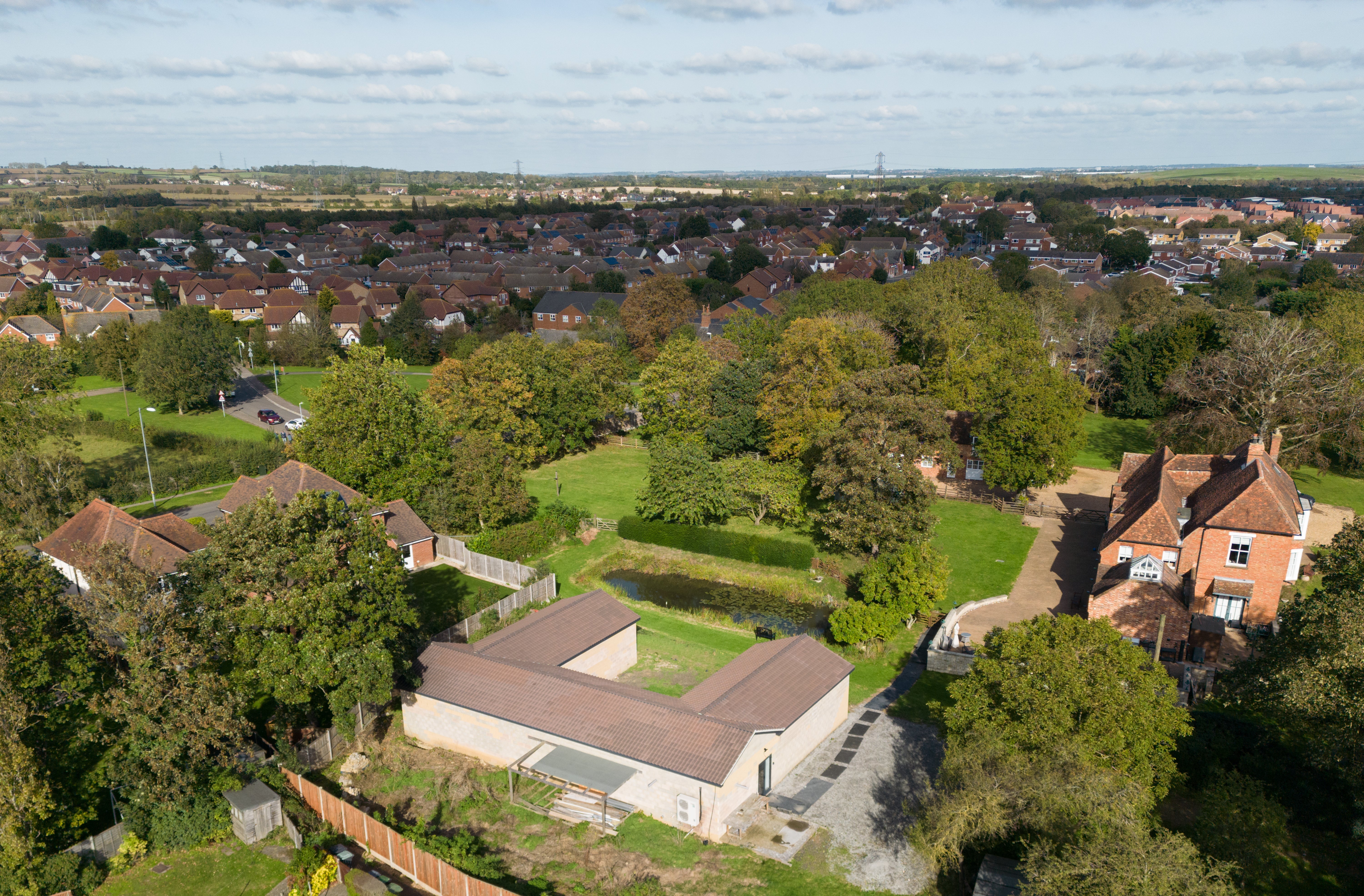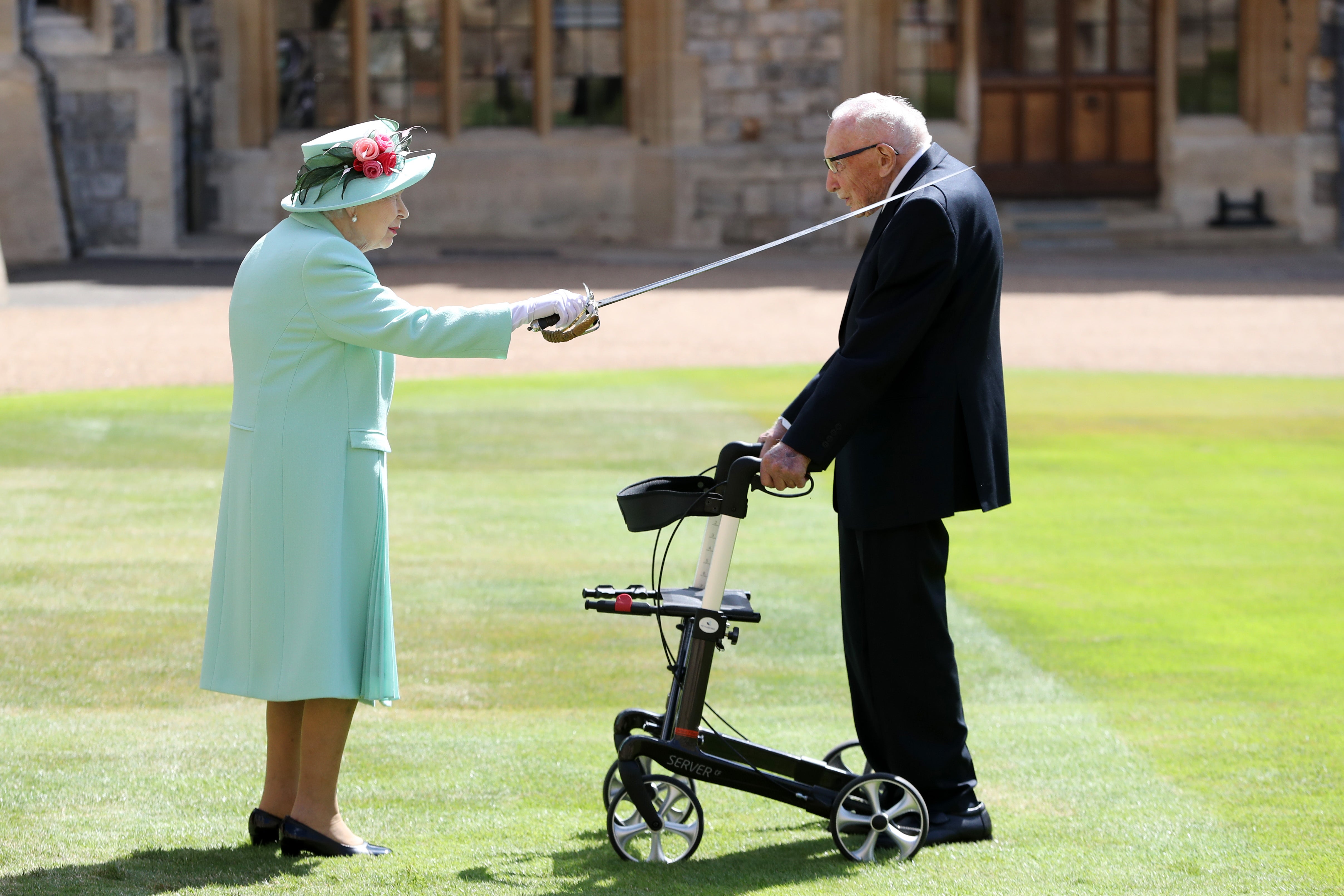I asked Captain Tom’s daughter about the £800,000 profit made from her father’s memoir - this is what she said
As it’s revealed that those working on his books believed a significant sum would be going to his foundation, writer David James Smith, having spent time with the Ingram-Moores, explains how he also asked for an explanation about a mysterious £800,000 profit made by her company and why this extraordinary story isn’t over yet...


Like a lot of people, I have been wondering what Captain Sir Tom Moore, who died nearly three years ago, would have made of the ongoing saga that surrounds his daughter, Hannah Ingram-Moore, and how his legacy has been used since his death.
When I met and interviewed Hannah at her Bedfordshire village home in the summer of 2022, I felt some sympathy for her. She had taken a lot of flak on social media, even death threats. Many people who knew next to nothing about her had taken against the family, so I wanted to meet her to try and understand what made Captain Tom’s family tick.
In email exchanges before our meeting, she said she was willing to talk if I was fair and positive. She told me there was an incredible story to tell, and she was right. Captain Tom, a veteran of the Second World War, had lived in obscurity for 99 years and 11 months. The Covid lockdown had begun just a few weeks before his 100th birthday. With the big centenary party cancelled, a void opened, and Tom, recovering from injuries sustained during a fall while unloading the dishwasher, started using his walking frame on rehabilitative circuits around the garden.
He was living with Hannah, then approaching 50, her chartered accountant husband, Colin Ingram-Moore, just turned 63, and their children – Benji, 16, and Georgia, 11. Hannah and Colin had recently started a business consultancy together, Maytrix, but lockdown had placed that on hold. Colin jokily suggested that they could sponsor Tom on his walks for charity. The idea amused them all, and Hannah sent out a press release to local news. That was it. One minute they were an ordinary anonymous family – OK, comfortable: their home was a gorgeous, listed rectory in substantial grounds – and the next they were dealing with the full media onslaught as the reaction to Captain Tom’s walks for NHS Charities Together snowballed around the world and escalated beyond anyone’s imagining.
It is an unassailable truth that the efforts of Tom, actively supported by Hannah, Colin and the children, raised just shy of £39m for the NHS charity, and they never touched a penny of it. Captain Tom went stratospheric. He was a sensation on Twitter. He wrote a memoir, which hogged the bestseller charts. More books followed. Michael Caine wanted to play him in the film, it was reported. It would be a “story about the power of the human spirit”. He was knighted by the late Queen Elizabeth, and jetted off with the Ingram-Moores on a lovely free holiday to Barbados. When they got back, Tom became ill with pneumonia, went into hospital, caught Covid, and died on 2 February 2021. A nation mourned.
Shielded by his family from the harsher aspects of modern public life, Tom died never knowing that the trolls had been out there, hating, almost from the start. “It would have broken his heart,” Hannah told me during our meeting. She spoke of the “outrageous negativity” and said that “the people who say those terrible things have no idea how hurtful they are being”.
I was struck by Hannah’s resilience. Her manner was brisk and business-like, but full of affection – love, damn it – for her father. She had welcomed him into their home without hesitation, and now he was gone she wanted to continue his work. I wanted to believe her when she told me she had acted out of love. “For us, it was all about pushing out a message of love and hope, and raising a bit of money. It was about giving my father a voice; letting him be heard.”

She wasn’t going anywhere, she said. But even then, I wondered if she was enjoying the reflected glory of her father’s fame, and the opportunities it presented, just a little bit too much. She and Colin had established the Captain Tom Foundation, a charity to take Tom’s legacy forward. They planned to add a Captain Tom Day to our national calendar. Hannah was prevented by the Charity Commission from receiving a proposed £100,000 salary as the charity’s chief executive. She served temporarily in the role for £85,000 (pro rata). Independent trustees came and went, and eventually Hannah stood down, but Colin remained.
The Charity Commission opened a review of the foundation, which turned into a more alarming statutory inquiry, citing concerns about the management of the charity and its independence from the family. The inquiry continues, but it was announced that the foundation is likely to close. It stopped taking donations over a year ago. I don’t imagine there will ever be an annual day when we celebrate Hannah’s father.
Meanwhile, Club Nook, a company started by Hannah and Colin a few days before the foundation was launched, was not a charity, it was a business. Hannah had trademarked Tom’s name, and appeared to have licensed it for commercial products with nominal commitment to charity. In life, Tom had been hot property; now he was intellectual property.
Just as my original article went to press, Club Nook published its accounts, showing a profit of £800,000. I immediately emailed Hannah and asked her if that was a result of the branding. “No,” she replied. “I can confirm that Club Nook has not profited from branded merchandising/memorabilia, that Club Nook has not been paid by the foundation for use of its trademarks and that Club Nook’s revenues have been generated by other activities.” I asked Hannah, in reply, how on earth, then, Club Nook had made £800,000. What were those “other activities”? She never replied. The questions were left hanging.

I was therefore fascinated watching Piers Morgan’s interview with Hannah and the family, when he quoted that part of my article back at her and asked, again, for an explanation. The interview was a revelation in more ways than one. It was certainly a surprise to see the whole family lined up against Morgan, children and all. What were Benji and his sister Georgia, still only in her early teens, doing there in front of the cameras in such awkward circumstances? Hadn’t they been through enough? As Hannah revealed, even Captain Tom’s teenage granddaughter had been sent hate mail and death threats – was it really wise to put them front and centre in what was becoming an uncomfortable conversation about “profiteering” and not the heroic endeavours of a much-loved grandad?
I had never seen the pool/spa building that Hannah’s family had created. When I visited in the summer of 2022, I was in the building opposite, which they used as offices for Maytrix, and which had become the initial repository for the thousands and thousands of gifts and letters that Tom had received from people around the world.
The spa had evidently been built after planning permission had been obtained for a Captain Tom building in the grounds of their home. Somehow, during construction, it had grown a limb, from an L-shape to a C-shape, and when they had sought retrospective permission, that had been refused. Neighbours in their home village of Marston Moretaine had written to the council to say the building was “ugly” and an “eyesore”. The council ordered it to be demolished.
After walking Morgan around the spa, a tearful and strained-looking Hannah was pressed by him to explain the source of the Club Nook profits. That was when Hannah threatened to end the interview, and filming was dramatically stopped. When it restarted, she and Colin finally revealed the truth: that “95 per cent” of the £800,000 had come from the royalties from Captain Tom’s books, which, they said, he had wanted them to have. It was the answer she had withheld from me a year earlier.

But it was a curious statement. Morgan didn’t challenge Hannah, so maybe hadn’t read the prologue of Captain Tom’s memoir – titled Tomorrow Will Be a Good Day – which expressly states in his own words that he welcomes the opportunity to write it as “the chance to raise even more money” for charity. So how, then, can that be squared with Hannah’s claim that he wanted them to have the book profits?
It has been revealed by The Times that a source involved in the release of Captain Tom’s books believed that “everyone that worked on the books was very much told that significant donation would be made by the family into the foundation”. The source also clarified, that the aim of the books was not specifically to raise money for charity and they had no knowledge of Captain Tom’s personal wishes.
Hannah is adamant that she has in no way exploited her father’s legacy for personal gain and there is no suggestion that the Ingram-Moore family acted illegally by keeping the money from the book sales, but questions around them won’t go away. One person missing from Hannah’s united family show for Morgan was her sister, Lucy Teixeira. I visited Lucy, who is two years older than Hannah, during my first meeting with the Ingram-Moores, at her home in Reading where she lived with her Portuguese-born husband and their two sons.
The sisters seemed alike in some ways – both smart and impeccably well-spoken – but they were markedly different in others. Lucy seemed less self-assured, and I could not imagine her sharing the public platform with her father as comfortably as Hannah. Lucy had felt excluded from some of the best moments of her father’s final months, notably his being knighted, which she had watched on television like the rest of us. She was not in his lockdown “bubble”, Hannah explained.
Lucy and Hannah had seen little of each other during lockdown, but were due to meet for lunch not long after I met them both. How Hannah is reacting to the latest suggestions of profiteering remains to be seen. Her father’s published will divides his estate, and therefore presumably, if not explicitly, his posthumous earnings from his books (if they really were intended to be kept in the family, as Hannah claims). He left just over £70,000 at his death. But it is still unclear exactly how the book royalties have been shared. The publishing conglomerate, Penguin Random House, has clearly done well from the books – though it has not responded to my requests for accurate figures about the scale of the sales, and whether it has made any donations from the proceeds to the NHS charity, or to any charity at all.
Finally, after all the apparent self-interest, there is still the symbolic lockdown heroism of the centenarian Captain Tom: the image of him traversing the garden with his frame, rising above his years for the greater good, and the more than £38m, pure and unsullied, that has been distributed by NHS Charities Together through numerous health projects to provide mental health support, training and equipment. The Charity Commission has made clear that the money raised for NHS Charities Together is not part of their on-going inquiry into the Captain Tom Foundation. It is to be hoped there is no evidence that will ever tarnish that achievement, leaving our fond memory of Captain Tom almost intact.
This article has been updated from two months ago





Join our commenting forum
Join thought-provoking conversations, follow other Independent readers and see their replies
Comments